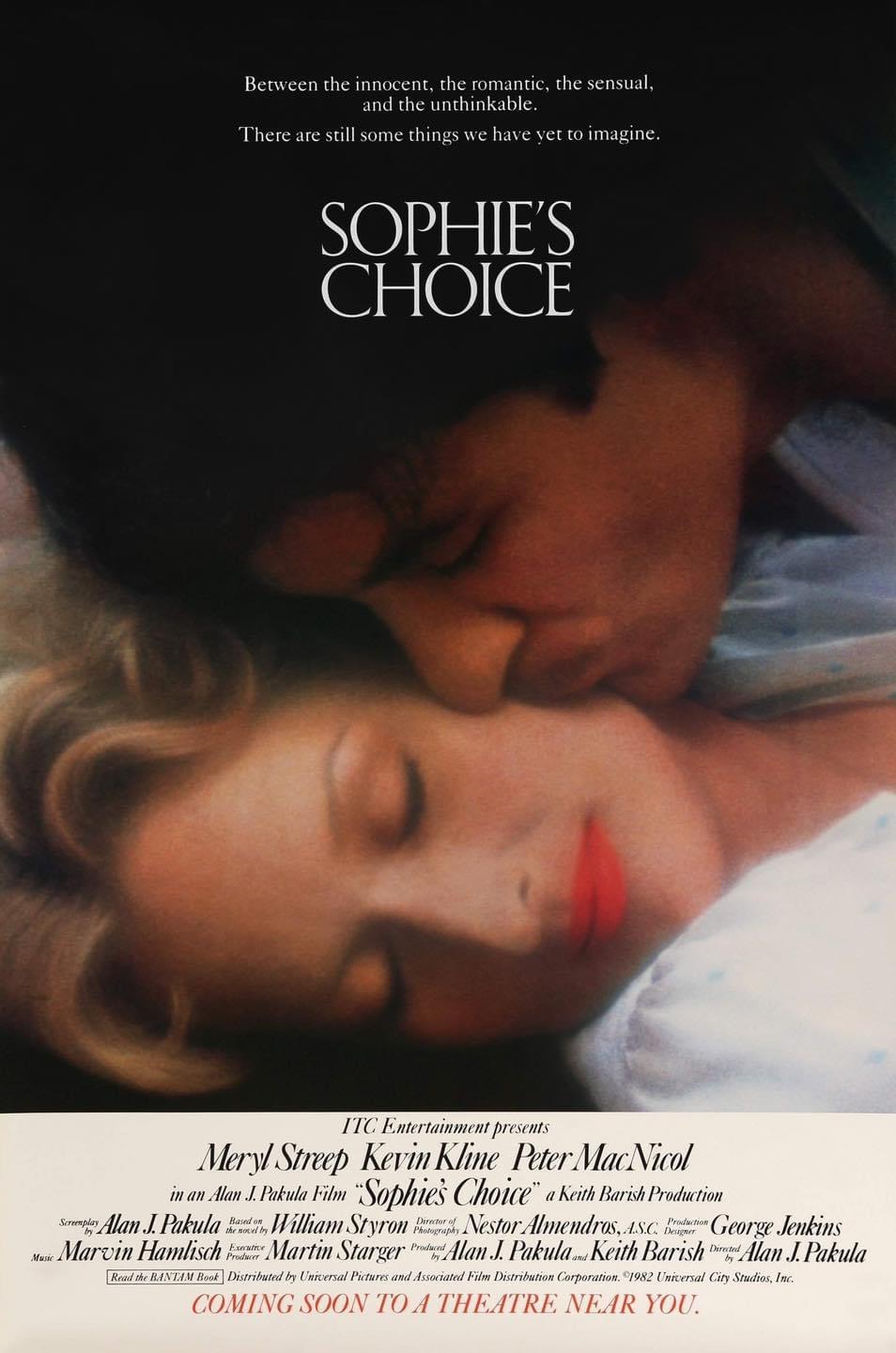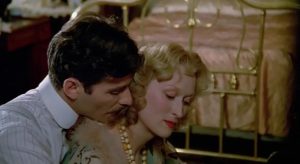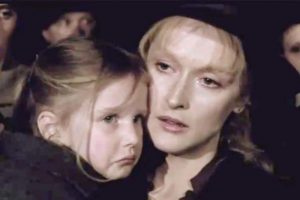Sophie’s Choice (1982)

Sophie’s Choice (1982), directed by Alan J. Pakula, is a haunting drama adapted from William Styron’s 1979 novel. Set in post-World War II Brooklyn, it tells the story of three intertwined lives—Stingo (Peter MacNicol), an idealistic young writer from the South; Nathan (Kevin Kline), a brilliant but mentally unstable man; and Sophie Zawistowski (Meryl Streep), a Polish immigrant and Holocaust survivor. Their relationships, fraught with passion, guilt, and tragedy, unravel as Sophie reveals her dark and painful past.
Suggested videos for you:
Plot Summary
The film opens in 1947 as Stingo moves to Brooklyn to write. Soon, he befriends Sophie and Nathan, his upstairs neighbors. Sophie is beautiful but haunted, carrying the weight of her past at Auschwitz. Nathan is magnetic, charming, and intense, but his mood swings reveal an underlying instability that fuels both passion and cruelty. As Stingo becomes closer to them, he is drawn into their world of intense love and painful secrets. Sophie eventually confides in him about her life during the Holocaust, culminating in the traumatic moment that forever defines her existence: a harrowing choice she was forced to make at Auschwitz, symbolizing the devastating inhumanity of the Holocaust and the moral dilemmas imposed by war.
Themes
Sophie’s Choice explores survival, trauma, and the corrosive effects of guilt. Sophie’s story illuminates survivor’s guilt in an unflinching way, revealing the complex psychology of those who lived through atrocities. Her “choice” reflects a universal horror, forcing viewers to confront the unimaginable brutality faced by Holocaust victims. The film also explores the nature of love in an often-toxic relationship, as Sophie’s connection with Nathan becomes a desperate attempt to find solace, however unstable, in the aftermath of trauma. Nathan, for his part, embodies both the attraction and destruction of manic love, as his mental instability and violence parallel Sophie’s internal anguish.
Performances
Meryl Streep’s portrayal of Sophie is one of cinema’s greatest performances. She seamlessly transitions between past and present, embodying a woman who is both vibrant and broken. Streep captures Sophie’s fragility, resilience, and profound guilt, delivering lines in a convincing Polish accent that conveys authenticity. The depth and restraint of her performance are most impactful in moments of silence—her expressions reveal layers of suffering that words alone cannot capture. This performance won Streep her second Academy Award, and it remains one of her most defining roles.
Kevin Kline, in his film debut, plays Nathan with a volatile charm that alternates between intense affection and chilling unpredictability. His energy and presence complement Streep’s quiet sorrow, and he masterfully captures Nathan’s charisma as well as his torment. Kline’s performance brings a frightening realism to Nathan’s mental illness, making him both appealing and unsettling. Peter MacNicol as Stingo is equally compelling, embodying the innocence and curiosity of a young man thrust into the complex lives of his friends. His Southern warmth provides a counterbalance to the darkness of Sophie’s story, making him a compassionate witness to her pain.
Cinematography and Direction
Alan J. Pakula’s direction is sensitive and deliberate, allowing the film’s emotional weight to unfold without manipulation. Pakula builds tension by focusing on the characters’ inner lives, using close-ups to capture their complex emotional landscapes. His choice to reveal Sophie’s past in fragments adds suspense and builds a haunting sense of dread, leading up to the infamous “choice” scene. Néstor Almendros’ cinematography further amplifies the mood, contrasting the vibrant colors of Brooklyn with the desolate tones of the Holocaust flashbacks. The visual shift between past and present reflects the dichotomy between Sophie’s attempts to move on and the inescapable horrors she has experienced.
The “Choice” Scene
The heart of the film—and the source of its greatest tragedy—is the moment Sophie was forced to make an impossible choice at Auschwitz. This scene is filmed with devastating simplicity, relying on Streep’s performance rather than dramatization. Pakula’s restrained approach intensifies the horror, forcing viewers to confront the stark cruelty of the Holocaust and the unimaginable moral dilemmas faced by its victims. The scene is both deeply personal and symbolically universal, representing the unimaginable cruelty faced by countless innocent lives.
Reception and Legacy
Upon release, Sophie’s Choice received widespread acclaim for its performances, especially Streep’s. Critics lauded the film’s sensitive handling of complex subjects, although some questioned the appropriateness of fictionalizing such a brutal element of Holocaust history. Despite this, the film is widely regarded as a poignant exploration of trauma and survival. Meryl Streep’s portrayal of Sophie has become iconic, solidifying her reputation as one of the greatest actors of her generation, while the film’s title has entered the cultural lexicon as a synonym for an impossible moral dilemma.
Controversy
The film sparked discussion about the ethics of dramatizing Holocaust experiences, with some arguing that such topics should be handled with extreme caution. Others praised Sophie’s Choice for bringing the psychological weight of the Holocaust into mainstream cinema in a way that encourages empathy and understanding. Nathan’s character, though fictional, has also been a point of contention, as his mental instability is exaggerated and stylized, raising questions about representation.
Conclusion
Sophie’s Choice is a powerful and haunting meditation on trauma, guilt, and the haunting grip of memory. It portrays the Holocaust’s psychological impact on survivors, examining the ways in which trauma shapes relationships and choices. While it grapples with complex themes, the film’s emotional depth and memorable performances elevate it beyond typical historical dramas. The devastating story of Sophie, Nathan, and Stingo remains a profound exploration of human suffering, resilience, and love’s redemptive yet often destructive power. Through its nuanced storytelling, Sophie’s Choice endures as a poignant testament to the unthinkable costs of war and the indelible marks it leaves on the human spirit.










